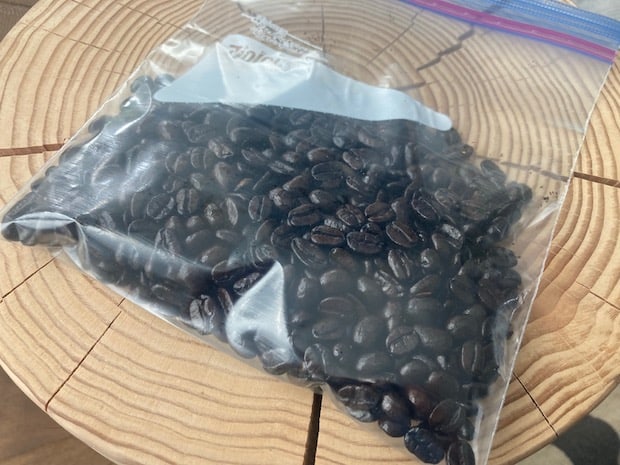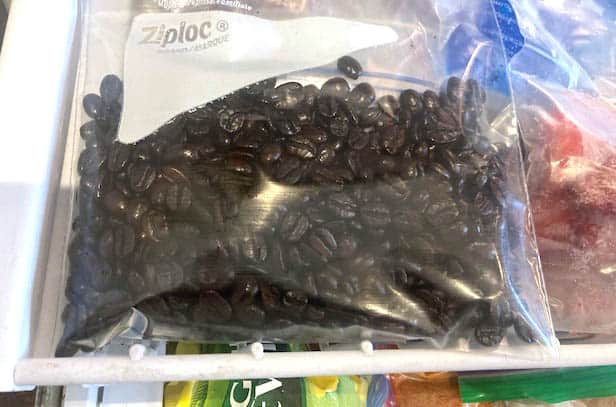Last Updated on December 9, 2023
Have you ever wondered whether or not you should freeze your specialty coffee beans? If so, you are not alone.
We’ve all heard the familiar conflicting statements:
- “You shouldn’t freeze your specialty coffee beans because it degrades the quality.”
- “You should freeze your coffee beans to keep them fresher and maintain the flavor longer.”
- “You shouldn’t freeze your coffee beans because they will absorb moisture and the odors of other foods in the freezer.”
- “You should freeze your coffee beans because frozen beans produce a more uniform grind.”
What is a coffee lover to do?
The short answer is that yes, there are benefits to freezing your beans, but there are steps you can take to do it the best way, in order to preserve as much flavor and quality as possible.

Why store coffee in the freezer?
Many chemical changes occur in coffee during storage, which result in flavor changes. For example, some of the volatile flavor molecules that are found in fresh coffee may be lost during storage, resulting in a weaker coffee aroma.
Additionally, fresh coffee has been found to be less bitter than stored coffee, regardless of storage temperature. This is because some of the molecules that contribute to bitterness and astringency in coffees, such as phenolic acids, may undergo reactions during storage that generate even more bitter molecules.
To maximize flavor and quality, the ideal time to brew specialty coffee is a few days after roasting, after the coffee has degassed and when it is still fresh. However, it is not always possible in our busy lives to regularly buy freshly roasted coffee in batches small enough to drink quickly.
If you have purchased more coffee than you can drink within a short time frame (noticeable flavor changes can occur within two weeks of roasting), then the next best option to preserve your coffee is to freeze it. Since roasted coffee beans are low in moisture, there is little water present to form ice, so the coffee is cooled but not actually frozen, and the structure remains intact.
Although freezing does not preserve coffee perfectly, it effectively extends the shelf life, which is the length of time it remains suitable for consumption. Freezing delays degradation processes that diminish quality and flavor.
You might also be interested to know that a 2018 study found that grinding the beans while they are still frozen yields a more uniform grind size, giving particles that are mostly similar in size rather than particles that are variable size. However, it has not yet been shown how a uniform grind size impacts flavor.
If you are going to freeze your coffee beans, there is a right way to do it and many common mistakes and pitfalls to avoid.
How to freeze coffee beans
Use an airtight container
Freezing your coffee in the bag it came in is a big no-no, because it is not airtight and roasted coffee is hygroscopic, meaning it is dry and readily absorbs surrounding moisture.

Instead, use airtight storage containers or bags, and you can even vacuum seal your container. This will prevent moisture, oxygen, and odors from other freezer food from coming in contact with your coffee beans and causing degradation or producing undesirable flavors.

Assuming you don’t want your coffee to absorb the flavor of the lasagna that’s been in your freezer for six months, airtight containers are the way to go.
Freeze in small batches
In fact, you may want multiple airtight containers if you are freezing a large amount of coffee. A container cannot be truly airtight if it is opened and closed several times.
Defrost before opening
If you open the container immediately after removing it from the freezer, the rapid environmental change will cause condensation (moisture) to form on your beans. It is recommended to allow the beans to defrost or thaw before opening. A good way of doing this is to allow them to defrost overnight, so they are ready for you in the morning.
Consider your roast level
There is not a huge body of scientific evidence on the effects of freezing coffee of different roast levels, but a 2018 study found that darker roast samples degrade more quickly at room temperature than lighter roast samples. This makes sense, as darker roasts have been shown to have higher levels of instrumentally measured volatile molecules, which contribute to the coffee aroma and flavor you perceive. These small aromatic molecules are lost more quickly than other molecules that contribute to flavor. The study found less of a difference between light and dark roast samples that were frozen. Therefore, if you tend to opt for darker roasts, keep in mind that you may want to freeze your coffee – the coffee aroma may degrade more quickly than lighter roasts at room temperature storage.

How long can you freeze coffee beans?
Although frozen coffee will still be safe for consumption long after the quality diminishes, the quality and flavor begin to degrade after a few months, so it is best to consume your coffee within that time frame.
Can you freeze ground coffee?
In theory, if your storage container is truly airtight, it should not matter whether you freeze your beans whole or ground. However, there are some benefits to freezing whole beans rather than coffee grounds.
Grinding creates many small pieces, therefore generating more surface area for many of the small aromatic flavor molecules to be released. This increased surface area also allows for increased interaction between the grounds and environmental elements, such as light, oxygen, moisture, and other freezer food odors. Exposure to these elements results in chemical reactions that may produce undesirable flavors.
Regardless, whether you store whole or ground beans, you will be delaying these degradation processes to some degree by freezing your coffee rather than storing it at room temperature.
Of course, these are simply suggestions to improve the flavor of your frozen specialty coffee. It is not always feasible to have multiple airtight containers or to freeze whole beans instead of ground beans. However, if you are able to follow at least some of these tips, you will be enjoying great defrosted coffee at home in no time (or rather, in a month or two).

